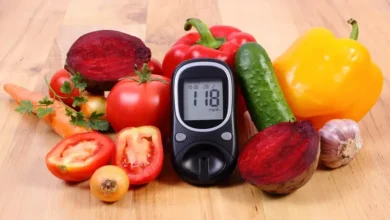High blood sugar is a concern for many people, especially in countries with a high rate of diabetes. Rather than relying solely on medication, adding certain fruits to your diet can support natural regulation of glucose levels. These five fruits are known for their fiber content, bioactive compounds, and low glycemic impact, which together help “absorb” or moderate sugar in the blood.
Best Fruits for Blood Sugar Control: Why These 5 Stand Out
Some fruits help control blood sugar not by reducing sugar directly, but by slowing its absorption and improving how it’s processed in your body. The right mix of fiber, antioxidants, and specialized compounds supports better insulin response and more stable glucose levels over time.
Here are the 5 fruits that are particularly beneficial:
1. Plum
Plums — whether fresh or dried (without added sugar) — are a great choice. They contain fiber and polyphenols, which support more stable blood sugar levels. Eating whole plums (rather than juice) maximizes their fiber benefits, helping your body manage glucose more efficiently. Pairing plums with protein or healthy fats (like nuts or plain yogurt) enhances this effect.
2. Berries (Strawberries, Blackberries, Blueberries)
Berries are rich in anthocyanins, powerful antioxidants that help reduce inflammation and enhance insulin sensitivity. They also have a low glycemic index, meaning they produce a slower, more controlled rise in blood sugar. Whether you eat strawberries, blackberries, or blueberries, they’re a smart and delicious addition to a sugar-conscious diet.

3. Kiwi
Kiwi is not just refreshing — it also has a relatively low glycemic impact. It’s rich in vitamin C and contains actinidin, an enzyme that supports digestion. These properties make kiwi especially helpful in moderating how quickly sugar is absorbed, while also reducing oxidative stress, which can harm blood sugar regulation.
4. Guava
Guava may sound exotic, but it’s one of the most effective fruit options for blood sugar management. Its high fiber content slows digestion, and its bioactive compounds help improve the body’s response to insulin. Eating guava whole provides maximum benefit — especially when combined with other nutrient-rich foods.
READ ALSO:
Follow our PAGE
5. Plum (again) / Alternative: Dried Plums
Yes, plums appear first on this list, but dried plums (prunes) deserve a special mention. The drying process concentrates their fiber and antioxidant compounds, making them even more potent for blood sugar support, provided there’s no added sugar. They offer a convenient, nutrient-rich snack that helps maintain glucose balance.
How These Fruits Really Help Regulate Glucose
- Fiber slows absorption: The soluble fiber in these fruits creates a gel-like substance in the gut, which slows carbohydrate digestion.
- Bioactive compounds: Polyphenols and antioxidants (like anthocyanins) help improve insulin sensitivity and reduce inflammation.
- Low to moderate glycemic index: These fruits lead to a gentler rise in blood glucose compared to high-GI foods.
- Digestive support: Enzymes like actinidin (in kiwi) support healthy digestion, which helps manage blood sugar peaks.
Tips to Include These Fruits Safely in Your Diet
- Eat whole fruits — not juices. The fiber in the flesh is what helps slow down sugar absorption.
- Pair fruits with protein or healthy fats. Try combining them with yogurt, nuts, or seeds to reduce spikes in blood sugar.
- Stick to reasonable portions. Even glucose-friendly fruits can cause increases if eaten in very large amounts.
- Eat them fresh when possible. Fresh fruit retains more fiber and beneficial compounds than processed alternatives.
- Monitor your response. If you have concerns about blood sugar, check how you react to each fruit. Everyone’s metabolism is different.
Who Should Be Cautious
These fruits can be very helpful for blood sugar control, but they are not a replacement for medical treatment. People with diabetes or pre-diabetes should always coordinate dietary changes with their healthcare provider. Also, dried versions of fruit can concentrate sugars, so portion control is especially important.
Final Thoughts
Incorporating fruits that help manage blood sugar into your daily diet can be a powerful, natural way to support glucose balance. The five fruits listed here — plums, berries, kiwi, guava, and dried plums — offer a mix of fiber, antioxidants, and enzymes that work together to slow sugar absorption and enhance insulin function.
Eating them regularly, in reasonable amounts, and paired with other healthy foods can boost your metabolic health in a delicious and sustainable way.

Hello! My name is Alan Teixeira and I am passionate about helping people live healthier, more balanced lives. From mindful eating to daily habits that promote physical and mental well-being, I believe that small, consistent changes can lead to powerful transformations.
I created this blog to share practical tips, reliable information, and thoughtful insights that can inspire you to take better care of yourself—with balance, mindfulness, and positivity.
If you are looking to improve your health, nourish your body, and build a lighter, more fulfilling routine, you are in the right place. Welcome!


